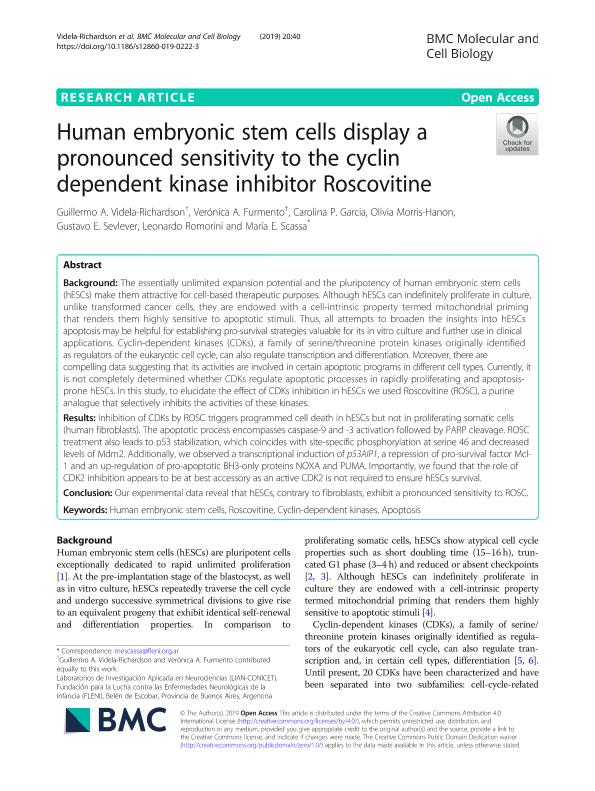Mostrar el registro sencillo del ítem
dc.contributor.author
Videla Richardson, Guillermo

dc.contributor.author
Furmento, Verónica Alejandra

dc.contributor.author
Garcia, Carolina Paola

dc.contributor.author
Morris Hanon, Olivia

dc.contributor.author
Sevlever, Gustavo

dc.contributor.author
Romorini, Leonardo

dc.contributor.author
Scassa, Maria Elida

dc.date.available
2022-04-20T16:55:38Z
dc.date.issued
2019-08-28
dc.identifier.citation
Videla Richardson, Guillermo; Furmento, Verónica Alejandra; Garcia, Carolina Paola; Morris Hanon, Olivia; Sevlever, Gustavo; et al.; Human embryonic stem cells display a pronounced sensitivity to the cyclin dependent kinase inhibitor Roscovitine; BioMed Central; Bmc Cell Biology; 20; 40; 28-8-2019; 1-15
dc.identifier.issn
2661-8850
dc.identifier.uri
http://hdl.handle.net/11336/155445
dc.description.abstract
Background: The essentially unlimited expansion potential and the pluripotency of human embryonic stem cells (hESCs) make them attractive for cell-based therapeutic purposes. Although hESCs can indefinitely proliferate in culture, unlike transformed cancer cells, they are endowed with a cell-intrinsic property termed mitochondrial priming that renders them highly sensitive to apoptotic stimuli. Thus, all attempts to broaden the insights into hESCs apoptosis may be helpful for establishing pro-survival strategies valuable for its in vitro culture and further use in clinical applications. Cyclin-dependent kinases (CDKs), a family of serine/threonine protein kinases originally identified as regulators of the eukaryotic cell cycle, can also regulate transcription and differentiation. Moreover, there are compelling data suggesting that its activities are involved in certain apoptotic programs in different cell types. Currently, it is not completely determined whether CDKs regulate apoptotic processes in rapidly proliferating and apoptosisprone hESCs. In this study, to elucidate the effect of CDKs inhibition in hESCs we used Roscovitine (ROSC), a purine analogue that selectively inhibits the activities of these kinases. Results: Inhibition of CDKs by ROSC triggers programmed cell death in hESCs but not in proliferating somatic cells (human fibroblasts). The apoptotic process encompasses caspase-9 and -3 activation followed by PARP cleavage. ROSC treatment also leads to p53 stabilization, which coincides with site-specific phosphorylation at serine 46 and decreased levels of Mdm2. Additionally, we observed a transcriptional induction of p53AIP1, a repression of pro-survival factor Mcl1 and an up-regulation of pro-apoptotic BH3-only proteins NOXA and PUMA. Importantly, we found that the role of CDK2 inhibition appears to be at best accessory as an active CDK2 is not required to ensure hESCs survival. Conclusion: Our experimental data reveal that hESCs, contrary to fibroblasts, exhibit a pronounced sensitivity to ROSC
dc.format
application/pdf
dc.language.iso
eng
dc.publisher
BioMed Central

dc.rights
info:eu-repo/semantics/openAccess
dc.rights.uri
https://creativecommons.org/licenses/by/2.5/ar/
dc.subject
APOPTOSIS
dc.subject
CYCLIN-DEPENDENT KINASES
dc.subject
HUMAN EMBRYONIC STEM CELLS
dc.subject
ROSCOVITINE
dc.subject.classification
Biología del Desarrollo

dc.subject.classification
Ciencias Biológicas

dc.subject.classification
CIENCIAS NATURALES Y EXACTAS

dc.title
Human embryonic stem cells display a pronounced sensitivity to the cyclin dependent kinase inhibitor Roscovitine
dc.type
info:eu-repo/semantics/article
dc.type
info:ar-repo/semantics/artículo
dc.type
info:eu-repo/semantics/publishedVersion
dc.date.updated
2022-04-18T13:35:21Z
dc.journal.volume
20
dc.journal.number
40
dc.journal.pagination
1-15
dc.journal.pais
Reino Unido

dc.journal.ciudad
Londres
dc.description.fil
Fil: Videla Richardson, Guillermo. Fundación para la Lucha contra las Enfermedades Neurológicas de la Infancia; Argentina. Laboratorio de Investigaciones en Neurociencias Aplicadas; Argentina. Consejo Nacional de Investigaciones Científicas y Técnicas; Argentina
dc.description.fil
Fil: Furmento, Verónica Alejandra. Fundación para la Lucha contra las Enfermedades Neurológicas de la Infancia; Argentina. Consejo Nacional de Investigaciones Científicas y Técnicas; Argentina. Laboratorio de Investigaciones en Neurociencias Aplicadas; Argentina
dc.description.fil
Fil: Garcia, Carolina Paola. Fundación para la Lucha contra las Enfermedades Neurológicas de la Infancia; Argentina. Laboratorio de Investigaciones en Neurociencias Aplicadas; Argentina. Consejo Nacional de Investigaciones Científicas y Técnicas; Argentina
dc.description.fil
Fil: Morris Hanon, Olivia. Fundación para la Lucha contra las Enfermedades Neurológicas de la Infancia; Argentina. Laboratorio de Investigaciones en Neurociencias Aplicadas; Argentina. Consejo Nacional de Investigaciones Científicas y Técnicas; Argentina
dc.description.fil
Fil: Sevlever, Gustavo. Fundación para la Lucha contra las Enfermedades Neurológicas de la Infancia; Argentina. Laboratorio de Investigaciones en Neurociencias Aplicadas; Argentina. Consejo Nacional de Investigaciones Científicas y Técnicas; Argentina
dc.description.fil
Fil: Romorini, Leonardo. Fundación para la Lucha contra las Enfermedades Neurológicas de la Infancia; Argentina. Laboratorio de Investigaciones en Neurociencias Aplicadas; Argentina. Consejo Nacional de Investigaciones Científicas y Técnicas; Argentina
dc.description.fil
Fil: Scassa, Maria Elida. Fundación para la Lucha contra las Enfermedades Neurológicas de la Infancia; Argentina. Laboratorio de Investigaciones en Neurociencias Aplicadas; Argentina. Consejo Nacional de Investigaciones Científicas y Técnicas; Argentina
dc.journal.title
Bmc Cell Biology

dc.relation.alternativeid
info:eu-repo/semantics/altIdentifier/url/https://bmcmolcellbiol.biomedcentral.com/articles/10.1186/s12860-019-0222-3
dc.relation.alternativeid
info:eu-repo/semantics/altIdentifier/doi/http://dx.doi.org/10.1186/s12860-019-0222-3
Archivos asociados
